No edit summary Tag: rte-wysiwyg |
(Adding categories) Tag: categoryselect |
||
| Line 274: | Line 274: | ||
<p style="text-align: left; color:rgb(0,0,0);font-family:TimesNewRoman;font-size:medium;font-weight:normal;line-height:normal;">Next: [[:Category:Nanotechnology|nanotechnology]]</p> |
<p style="text-align: left; color:rgb(0,0,0);font-family:TimesNewRoman;font-size:medium;font-weight:normal;line-height:normal;">Next: [[:Category:Nanotechnology|nanotechnology]]</p> |
||
[[Category:Productive forces]] |
[[Category:Productive forces]] |
||
| + | [[Category:XX century]] |
||
| + | [[Category:XXI century]] |
||
Revision as of 09:36, 23 February 2017
Previous: the information revolution
V. Social consequences of the IT revolution
The price of computers has been coming down. For example, a Toshiba Satellite notebook cost around $2500 in 2003, but only around $1400 in 2006.
According to Gartner group, in the year 2005, 218 million computers were sold worldwide, which is 15% more than in the previous year. The sales of notebooks increased by around 25%, while the sales of desktop computers increased by 5.3 - 10%. Thus, we see a global spread of information technologies, with a parallel increase in mobile lifestyles.
Cheaper computers, increasing global sales mean an increase in computer literacy globally.
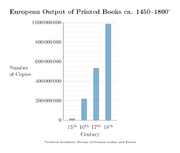
Spread of general literacy, due to increasing number of books printed, was an important factor in bringing about a global capitalist revolution against the feudal system. We can expect the same to happen vis-a-vis the now decrepid world capitalist system and bureaucratically deformed former "socialist" states.
Perhaps, a new kind of "Enlightenment" is ahead of us.
1) Private property vs. free information

A cartoon from "The Economist"
Licensed software, aimed at making a profit, is being superceded by free software. For example, Microsoft products, such as "Windows", are being replaced by a "freeware", for example Linux OS.
In "Copyleft vs. Copyright: a Marxist Critique", by Johan Söderberg, we read about Linux: "The program is the biggest and most widely recognised free software project and is of particular significance. Being an operating system, Linux is of relevance to a wide range of computer applications. And of major symbolical importance, Linux is challenging Microsoft's key product, Windows. Linux is based on the efforts of at least 3,000 major contributors of code, scattered over 90 countries and five continents. Even in the highly organised and hierarchical corporate sector, it is hard to find engineering developments comparable in size and geographical reach to that undertaken by the Linux project".

Shawn Fanning
Shawn Fanning, an inventor of "Napster", a music-sharing program, has been called "an Antichrist" by music companies. "The New York Times", on November 20, 2005, wrote: "Album sales are 30 percent below their level the year when Mr. Fanning let Napster loose, and 10 times as many songs are downloaded from file-sharing services as are bought from
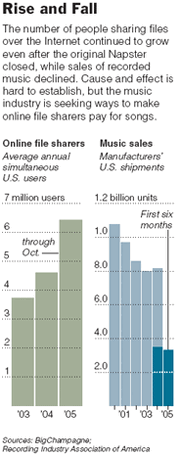
Music sharing (source: The New York Times)
paid services like iTunes". When sales are decreasing, while music sharing is increasing, we can say that the concepts of "commodity", "deficit" and "economy" are on the way out.
People have to invent a new way to produce, which involves sharing. In "The Economy of Ideas" John Perry Barlow asks: "If our property can be infinitely reproduced and instantaneously distributed all over the planet without cost, without our knowledge, without its even leaving our possession, how can we protect it? How are we going to get paid for the work we do with our minds?" One possible answer is doing w/out money, on both sides of the issue. People should be free to use our products, but so can we use theirs.
Sources of information that charge money are being superceded by free sources of information. One example is the rise of Wikipedia, the free encyclopedia. "With 45,000 registered users adding some 1,500 articles each day, Wikipedia ranks 37th as one of the most-visited sites on the Internet". According to a recent report, the standard of articles in Wikipedia is comparable to Encyclopedia Britannica. "The confirmation that the collaborative work is as accurate as well-known encyclopedias could spell problems for online pay-to-play encyclopedias, such as Britannica Online and MSN's Encarta."
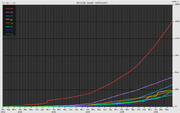
Growth of Wikipedia articles
Growth of article count in Wikipedia, in different languages, is given by the graph on the right.
The old concepts of capitalist economy are replaced by "intercreativity", "free ware", "torrent" file sharing, "wiki", etc.
2) Changes in society
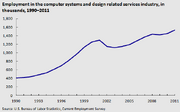
Increase in employment in computer systems in the U.S.
Employment shifts from industrial workers to "information technology" specialists, see graph on the left.
Programs such as "Skype" allow to make video phone calls for free. Programs such as "Viber" allow to make regular calls for free, anywhere on the globe. This is a serious threat to regular telecommunications companies.
People buy more and more things over the Internet, by-passing the middle men, the traders and retailers. According to Forester Reserch, the volume of Internet sales in 2006 in the United States was $96 billion, which is 26% more than in the previous year.
Internet shopping is done mostly by people who deal with computers and Internet on everyday basis. The author of these lines recently bought a multimedia projector through an Internet store in Kiev, and saved around $200 (around 15%) in comparison to a regular store price. As a RAND 2003 report notes, e-commerce is making transaction taxes (e.g., sales taxes) difficult to collect. "Regulation and licensing are becoming increasingly difficult when service providers are beyond national jurisdictions". This is a threat to a national state.
Computers lead to making the jobs of people less repetitive, more creative. Bill Gates says: "Give your workers more sophisticated jobs along with better tools, and you'll discover that your employees will become more responsible and bring more intelligence to their work. One-dimensional, repetitive work is exactly what computers, robots and other machines are best at - and what human workers are poorly suited to and almost uniformly despise. In the digital age, you need to make knowledge workers out of every employee possible."
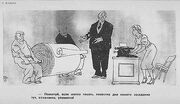
A Soviet era cartoon: a director asks a secretary to write neatly on the roll of paper to fit in the agenda of a meeting.
Computers undermine government bureaucracy. Again, Bill Gates: "Paper consumption was only a symptom of a bigger problem, though: administrative processes that were too complicated and time-intensive". In running a company, he advocates a switch from paper documents to electronic documents.
The structure of Internet implies a less hierarchical, more equal global society. Timothy Berners-Lee (TBL) remembers: "There was a lot of people I spoke to initially (who) wanted the Web to be hierarchical because they wanted the hierarchical feeling of control". However, TBL had an own vision of society: "I'm very interested in a more fractal, less hierarchical structure arising in society". Hence, he creates a structure for WWW, which is "a vision encompassing the decentralized, organic growth of ideas, technology, and society... There is the idea that society can run without a hierarchical bureaucratic government being involved at every step, if only we can hit on the right set of rules for peer-peer interaction".
A similar idea is expressed in "Information revolution and modern International relations" by D. G. Baluev, 2001. He says that a consequence of the information revolution is a weakening of the hierarchical structures. This happens because there is a shift from a relative poverty of information to its abundance, thus allowing individuals to circumvent those who attempt to control the society through controlling information and knowledge.

Internet leads to the possibility of "teleworking", which means " working on a job from afar via telecommunications technologies". This is an opportunity for a mobile lifestyle, an end to cities. People living such a lifesyle are more likely to develop both intellectually and physically, opening a possibility of a classless society.
4) Political implications
People who yesterday went to a library or turned on TV, today turn to computers and Internet. This means more independent thinking among the masses. Bill Gates says: "Anytime we have new forms of communication it changes behavior whether it is political or business or any type of behavior. Radio and T.V. did that. The PC will be classed as big or bigger an advancement in communications than those devices were. So far it is mostly electronic mail, printing, newsletters. But even at this stage that means that it is so much harder to suppress word getting out about things". Just remember the Wikileaks as an example.
The hackers break into government servers. In 2001, we read on CNN news: "I would definitely rather be sitting at a computer right now," said a 19-year-old who cofounded a hacker group called Global Hell, or "gH". The shelves and sockets in his apartment are now bare following an FBI raid. Global Hell was the name splashed on the official Web site of the White House after it was hacked in May".
Another example of social opposition to government are "Flash mobs". On July 3, 2003, we read on "Wired News": "Inexplicable "flash mobs" are starting to form all over. Flash mobs are performance art projects involving large groups of people. Mobilized by e-mail, a mob suddenly materializes in a public place, acts out according to some loose instructions, and then melts away as quickly as it formed. In New York, the city's finest turned out in force to block the city's third mob gathering last Wednesday evening. Set to gather at 7 p.m. at Grand Central Station for what promised to be an elaborate "mob ballet," the crowd of about 250 was greeted by a "huge" police presence, according to the Mob Project's anonymous organizer known only as Bill. Bill said the mob moved to the Grand Hyatt next door instead. The crowd walked quietly upstairs to the hotel's mezzanine and gathered shoulder-to-shoulder around the balcony. "At 7:12, we burst into thunderous, screaming applause for 15 seconds, and then dispersed, just as police cars came screaming around the corner to where we were," said Bill. "It was fabulous." This is a sign of a growing opposition to the imperialist state gathering within the computer-literate society.
Internet is a new tool for social and political organization. For example, Facebook was used to organize "Arab spring" protests in 2011-12.
5) New kind of revolutionaries
A social revolution is a sequel to a revolution in methods of production, and visa versa. Hence, social revolutions are conducted by the same class of people who lead the revolution in methods of production. One example of this we've seen in the Industrial revolution (headed by craftsmen, mechanics, traders, travelers, bourgeoisie, factory owners, etc), leading to the French revolution (led practically by the same group of people). The French revolution, in turn, created conditions for the Industrial revolution really taking off.
So, it's curious to observe what kind of people lead the Information revolution.
Geographically, the Information Technologies are leaving the U.S. and Western Europe and going to China, Russia, India, etc. Most of the computers in the world today are produced in China, including the famed "Apple". The RAND 2003 report reads: "the United States and parts of Western Europe are not producing an adequate supply of workforce entrants with high-level IT-relevant competencies in science, mathematics, engineering, and technology". In "The New York Times", from Sept.13, 2004, we read that around 200 companies a year establish their research centers in China.
WWW was conceived in CERN by Timothy Berners-Lee (TBL). He was a son of mathematicians who got a degree in physics and became interested in electronics. So, modern revolutionaries are highly educated people.
The first people who understood the significance of Semantic Web were people in the biological community. TBL says: "The whole area of life sciences and healthcare has been hopping with excitement as work is done to take down the boundaries between different silos of information across the field. We had a very vibrant workshop in the area, and Semantic Web was the talk of the recent BIO-IT conference ... These communities (High Energy Physics, Life Sciences) are full of people who have very big challenges to tackle, and are largely scientifically minded people who understand the new paradigm."
Again, we talk of "scientifically minded people who understand the new paradigm".
Information revolution involves philosophers and reserachers in Artificial Intelligence. In an article in "Scientific American", 2001 issue, TBL says: "For the semantic web to function, computers must have access to structured collections of information and sets of inference rules that they can use to conduct automated reasoning. Artificial-intelligence researchers have studied such systems since long before the Web was developed. Knowledge representation, as this technology is often called, is currently in a state comparable to that of hypertext before the advent of the Web".
Semantic Web involves "knowledge representation", or a new organization of knowledge. The entire human knowledge must be surveyed and mapped. This is a project similar to the "Encyclopedia of Sciences, Arts and Trades" of Enlightenment of XVIII century.
This is a project not for narrow "professionals", but for people of encyclopedic knowledge and practical abilities.
The spread of computer technologies goes hand-in-hand with automation of production. According to "Computerization as a pre-condition of a socialist revolution", by Vladislav Bugera, 1998 , automation leads to manual workers being replaced by human overseers of equipment. That means workers are becoming managers manipulating information. V. Bugera continues: "within the world proletariat there is a growing (although yet rather thin) layer of workers who, in their everyday activity, obtain the skills of self-management, through the medium of the computer systems". Hence, Bugera draws conclusions for political activity: "No political organization among those that exist can pretend to be a modern revolutionary proletarian party if its program doesn't include the following:
- free education in computer literacy by all members of society
- free supply of computer equipment to workers' political organizations
- development of computer methods of control over management by workers
- development of computer systems which allow masses of workers to make management decisions
Finally, Bugera proposes a slogan: "Computer is the weapon of proletariat". But, can we call "proletarians" those who work through computers?
Perhaps a better slogan would be: "Computer is the weapon of the modern social revolution".
VI. The information revolution in the ex-USSR
1) Russia
An attempt to restore capitalism in Russia has thrown the society back. While in 1990, there were 1.6 million scientific workers in Russia, 10 years later only half of the number remained. By August 2000, 30 thousand of some of the best Russian scientific workers have emigrated abroad. For example, among them we find Andre Geim and Konstantin Novoselov, now of University of Manchester, who obtained a 2010 Nobel Prize in physics for invention of graphene .
In spite sliding back to capitalism, Russian educational system has remained relatively good. Jason Horowitz, a director of a project "Sun", notes that Russian programmers are good in problems requiring strong mathematical skills. According to him, the Irish, Indian, Israeli and Czech programmers are not as good. In 2000, from 5 to 8 thousand Russian programmers were involved in "offshore programming".
While in 1990, there were 23 million telephone lines in Russia, by 2000 there were 31 million lines, an increase of 30%. However, that still means that in 2000 in Russia, for every 100 people there were 22 telephone lines. By contrast, in Germany there were 61 telephone lines, and in the United States 70 telephone lines, and of much better quality.
In the year 2000, there were 2.8 million subscribers of mobile telephone service in Russia, and the number doubles every year.
In January 2001, 3/4 of Russians surveyed never used computer. Yet, in 2001, the number of Internet users has increased in Russia by 39%, in comparison to 2000, and made up 4.3 million people.
According to a state report, in Russian schools in June 2001 there was 1 computer for every 500 students. Only 1 school out of 50 had access to Internet. In the United States, almost all elementary and junior high schools have access to Internet.
According to RAND report "Russia and the Information Revolution", from July 2002, the Russian government has started a program called "Electronic Russia". Its goals are to provide access to Internet for all places of higher learning by 2005, and for all public schools by 2010.
In 2002, according to the Russian Ministry of Communications and Information, the number of computers in the Russian Federation has grown by 20% in comparison to 2001. The volume of the IT market has grown by 9% and made up $9 billion.
In 2003, the Russians bought 3.8 million computers. Over the course of the year, the market has grown by 263%. The fastest growing segment of the market is notebooks.
In Russia, the sales of desktop computers in 2005 was 4.8 - 5 million units, which is an increase of 10.5-12% in comparison with 2004. The sales of notebooks has grown at a faster pace. In 2004, 3 out of 4 computers were desktop. In 2005, there were 2 out of 3 desktop computers.
The number of Internet users has been growing in Russia in following manner:
| fall 2002 | winter 2002 | spring 2003 | summer 2003 | fall 2003 | winter 2003 | spring 2004 | summer 2004 | fall 2004 | winter 2004 | |
| daily users | 2.1 million | 2.8 | 3.2 | 3.0 | 3.2 | 3.8 | 3.3 | 5.0 | 5.6 | 5.2 |
| weekly users | 4.5 million | 5.5 | 6.4 | 6.1 | 6.9 | 8.2 | 8.5 | 9.5 | 10.1 | 10.3 |
| monthly users | 6.5 million | 7.7 | 7.9 | 9.0 | 9.9 | 11.6 | 12.0 | 13.4 | 13.7 | 14.2 |
In "A typical portrait of a user of a RU net", from 21 December 2005, we read:
1) Approximately 15% of Russian citizens have access to Internet.
2) A typical RU net citizens has over 4 years of experience on the Net.
3) The most important uses of Internet for Russians are information (89.3%), e-mail (84.7%), news (71.1%), communications (53.1%). Shopping accounts for 16.8%.
4) 41% of those surveyed have access to broadband.
5) 7.8% of respondents have "free" Internet, e.g. they use it at work. Most spend from 21 to 30 dollars per month on Internet service.
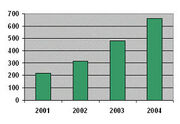
According to "C-News - a publication about high technologies", the dynamics of the "business to customer" electronic market in Russia is given by the diagram on the right.
Most frequently, the people buy computers on the Net. The second place is occupied by house appliances, such as washing machines.
On 31.03.05 we read that Moshkov, an editor of www.lib.ru, one of the biggest Russian Internet libraries, was fined thousands of rubles for publishing on his site a copyrighted book. The writer of the book, Edward Gevokian, was supported by a right-wing internet resource "KM online". KM supports such reactionary measures as introducing property requirement for voting. It also supports such politicians as Edward Limonov, a leader of NBP (Nationalist Bolshevik Party), a proto-fascist organization.
Russia is slowly getting pulled into the world-wide Information revolution and social-political struggle is developing on the vast space of RU net.
2) Ukraine
The story in Ukraine is similar to that in Russia. The number of computer users has been steadily increasing. In 1998, from 90 to 200 thousand computers were sold (the exact number is unknown for many of transactions are "illegal", to avoid paying taxes and extortion fees). In 2000, from 140 to 280 thousand computers were sold.
The total number of computers in Ukraine was (in thousands):
| 1.01.1999 | 1.01.2000 | 1.01.2001 |
| 404.6 | 630.6 | 965.5 |
Thus, we see an increase of around 50% a year.
In 2001, under pressure from the West, the Ukrainian government attempted to combat "computer piracy". Thus, while "Microsoft Office XP" costs around $580 in the U.S., on the Ukrainian market the same system sells for $2.20. At some point, it became harder to buy "unlicensed" software, but then things returned to status quo.
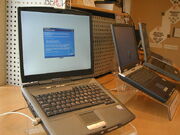
While in 1990's only imported computers were sold, in 2000's we see companies in Russia, Ukraine, etc. which assemble computers from parts imported from Taiwan or China. One example of such a company is "Versia" in Ukraine. The company was created in 1994. In 1996 they assembled their first desktop computers. In 2001, they started to produce notebooks (see photo on the right, circa 2003). In 2003, they produced their first palm PC.
However, later the market was glutted by the Chinese brands, such as "Acer" and "Asus", which made it unprofitable to assemble computers in Ukraine. The author of these lines has bought an "Asus" computer in the fall of 2006 with following characteristics: 1) processor Intel Core Duo T2250 (1,73GHz), 2) 1 GB of RAM, 3) 100 GB of HDD, 4) a Web camera. The price was 6900 hrivnas (around $1190). A similar notebook from "Versia" would cost around 9000 hrivnas.
In 2003, the computer market in Ukraine has grown by 82.4% in comparison with 2002. The sales of notebooks has increased by 99.9%, and the sales of servers by 52%.
On 18th October 2005, Hewlett-Packard began a production of computers in Ukraine. The potential of the factory is 100 thousand computers per year. They will be $40-100 cheaper than similar computers produced in Europe.
As for Internet, we have the following statistics:
In December 2000 - 500 000 users, June 2001 - 750 000, October 2001 - 2 million, in the year 2006 - 3 million. The main reason for relatively low number of Internet users in Ukraine was poverty. 90% of the population concentrate on buying basics, such as food and clothes.
The following table provides Internet rates in Kiev, in the year 2002, for a dial-up service:
| Company name | hours and rates | ||
| Viaduk | 8-20: 80 cents/hour | 20-23: 40 cents/hour | 23 - 8: 20 cents/hour |
| Svit | 9-21: 70 cents/hour | 21-9: 30 cents/hour | weekends: 30 cents/hour |
| Goodwin | 9-20: 40 cents/hour | 20-9: 20 cents/hour |
In 2004, access to Internet via provider called Zeos cost: from 9-19: 40 cents/hour, from 19-0: 30 cents/hour, from 0-9: 18 cents.
In 2006, at our home in Kiev we have used 2 Internet providers a for dial-up service: "Prosto" and "Express". The prices were no longer quoted in U.S. dollars, but Ukrainian hrivnas, which made the Internet much more accessible. As of September 2006, 1 U.S. dollar = 5.03 Ukr. hrivnas.
| company name | hours and rates | ||
| Prosto | 8 a.m.- midnight: 60 kopecks/hour (i.e. around 12 cents/hour) | midnight - 8 a.m.: 30 kopecks/hour (i.e. around 6 cents/hour) | |
| Express | 8-12: 50 kopecks/hour | midday - 1 a.m.: 1 hrivna 60/hour (around 32 cents/hour) | 2 a.m. - 8 a.m. - free |
To summarize: in 2002, I used "Viaduk" and could afford to work only during the night, from 11 p.m. to 8 a.m., at the price of 20 cents/hour. As a result, the nights were often sleepless. In 2006, I could afford to use the Internet during the day (Prosto), and I paid 12 cents an hour. In other words, over 4 years, the price for Internet dial-up service has come down 50% and made it possible to work at home during the day.
In 2006, I moved into a new apartment and got connected to a broadband service, working at 10 Megabits/second. The provider, "Delta Net", charged 18 kopecks per megabyte, or 180 hrivnas per Gigabyte of traffic, i.e. around $36, with no monthly fees. Later, I switched to "unlimited-lite" service. The fee was 50 hrivnas per month, for unlimited traffick, for speed up to 10 Mbit/sec.
Also, a satellite Internet service appeared. One provider was called "Data Group". The prices were: $240 for installing the equipment, $109 per month for 64K of unlimited traffic. We can suppose that in a few year the satellite Internet will decrease in price, as did the dial-up service.
Addendum: in 2008 I have started using mobile Internet, in a provincial town in Ukraine. For that, I bought a new cell phone, to serve as a modem. This got connected to a notebook which was used on a sail yacht. The price for mobile Internet was reasonable: 5 hrivnas per day (1 dollar) plus 5 kopecks for each megabyte.
In 2014, I started using 3G mobile Internet, from "People Net" , in Nikolaev, on board of a yacht. The internet service covered all my needs in Skype and information (speed up to 3.1 Mbit/sec). This cost around 200 hrivnas per month, or $10.
Next: nanotechnology